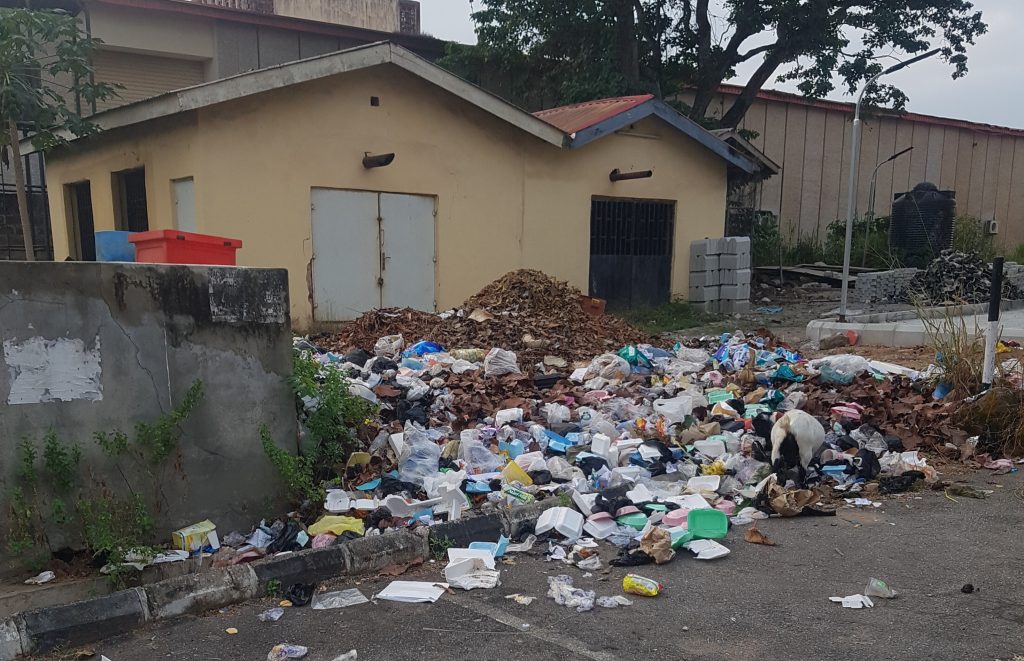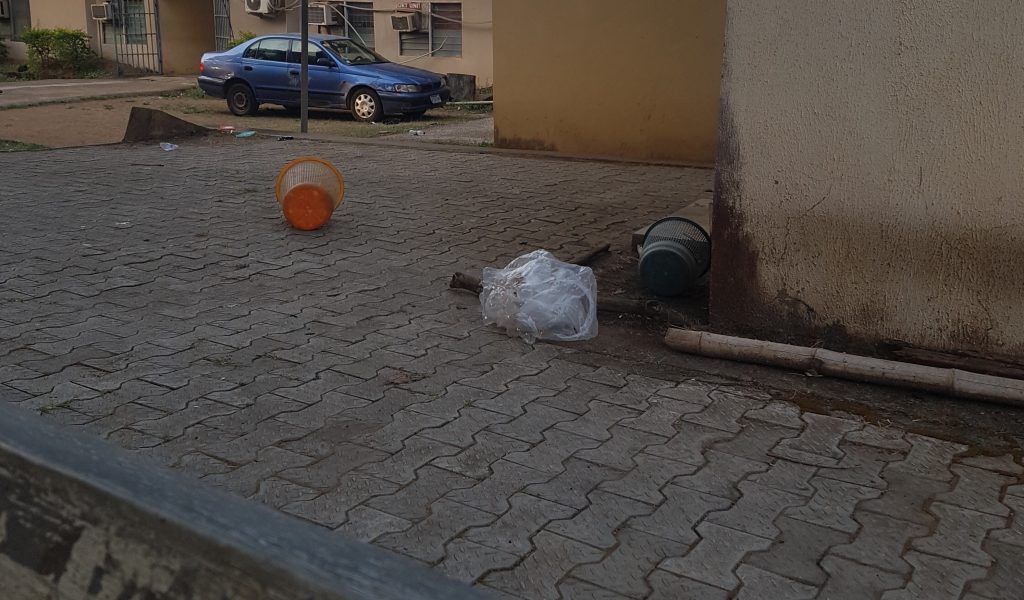By: Bukola Odusanya
For the first few weeks of resumption, the A-Block of the female-populated Obafemi Awolowo Hall had an enclosed fence facing the hill, with a nice garden area; the grasses had been freshly mowed, and the view could raise one’s spirit on days when studying became a hassle.
However, as days went by and human activities in the hall grew, the once-pretty view began to be adorned with sachet water nylons, food waste, eggs shells, and plastic bottles, at a very fast rate. Before anyone could say jack Robinson, the beautiful garden had chameleoned into a dump site.
A concerned student in this area of the hall who resided on the last floor blamed those who stay on the upper floor for the degradation of the hill. She had expressed her concern to the people and had requested that they all cleaned the area but was met with nonchalance. Another resident of the hall had insisted that “people downstairs were insensitive to the pains of those upstairs”. She said it was not convenient for them to always get down to dispose waste.
The matter quickly shifted from the effects of the waste in the area- the breeding of mosquitoes, malaria, the stench of the air- to a matter of personal hygiene. Experts agree that indiscrimate waste disposal often lead to environmental pollution and can block water drains, which could lead to the spread of diseases like cholera and malaria. Sadly, students of Nigeria’s Premier University of Ibadan often approach waste management with utter indifference. Although some strategic locations were found without waste bins, students rarely use the bins where they are provided. Some of the students interviewed, when queried on their indiscriminate disposal of waste, said they assumed that some people had been employed to clean up after them.
If you were to take a stroll around the university of Ibadan, you would undoubtedly encounter a trail of plastic waste and a number of dumpsites competing for space with lush vegetation, and lofty buildings, while students, who are the major culprits, go about their daily lives.

Opposite the driveway to enter the faculty of technology, are two blue drums for storing dirt that is full to the brim and running over around its perimeters. When you move forward to the zoo junction, to the left were another set of drums used for storing dirt that was also spilling over. Students who pass that route assert that the drums had been like that for weeks yet they were not taken by the waste trucks. Students are using that as an excuse to litter the floor.
Now if you get to SUB park and walk backwards you would find yourself in the faculty of arts, where we have sitting several dustbin, which from the image below shows that students are more conscious of their environment and make use of the waste bins.

However, opposite the Kennet-Dike library is a refuse dump and then moving ahead next to the library is a newly constructed building with a makeshift refuse dump area. Adjacent to the building is the faculty of the education lounge area, small waste bins were kept on the floor, along with plastic bottles and nylon.

Inferring from above, students exhibit different attitudes towards waste disposal; swift response system, lack of waste disposal facilities, and people’s attitudes towards waste disposal are factors that affect waste management. Some students who spoke with UCJ UI justified their indiscriminate disposal of waste with the lack of adequate waste bins, while some do not even look around for a bin before they litter the ground.
When asked if they knew the possible impact of their actions on the environment, some of them expressed ignorance. Meanwhile, all the students agreed that a reminder would aid them to dispose of waste properly. Of the ten students interviewed, while 7 students believed that climate change was not propaganda, 3 believed it was.
Waste Management And The Climate
The feedback from students brings the nail to the head on the problem of environmental pollution on campuses, people do not seem to carry a constant consciousness of the implication of their waste disposal systems. Every single plastic or nylon not properly disposed of can be a catalyst to a flood or environmental issue. As young adults who are being incorporated into the workings of society, there is no better time to Instill the right attitude towards environmental issues or better communal living than now.
Man is in an endless relationship with waste; transforming materials from one state of matter to another would usually necessitate the availability of some sort of waste. The conversion of your soda to glucose in your body would leave the plastic bottles as the unwanted material in the transformation process. Therefore, the absence of waste is simply impossible, we can only like every human endeavour seek to improve the relationship we have with waste.
2022 was a year that made us highly attuned to the grievous implications of over-exploitative human activities on natural resources, the problem of a self-serving government, and the ignorance of the people.
The problem of a self-serving government
Here is what; In the country of Cameroon, 50 km south is located the city of Garoua is the ladgo reservoir, a dam built in 1977 and 1982. The dam had begun to overflow since the first series of floods in 2012, however, climate change alongside the heavy rainfall according to the Nigerian government resulted in floods which have sacked various communities across the country, since the 13th of September this year.
According to the World Weather Attribution Project, climate change has increased both the likelihood and severity of floods, and the Heavy rains that came in September have been indeed playing a direct role in the surge in flooding cases in recent months.
The excess water from the dam flowed through River Benue and its tributaries, flooding communities in the states of Kogi, Benue and other North Eastern states with a flood that came with heavy casualties.
Nonetheless, a little diving into the issue we can see how human actions/inaction has contributed to the tragic loss of lives and properties in Nigeria. At the construction of the dam in 1982, the Nigerian government had agreed to ensure a proper flow of the Dam. This was to be the Dasin Hausa Dam project, forty years later we are still dancing around the same issues, because successive governments since then refused to implement that agreement.
An estimated two million people have been affected by flooding this year. As of October, over 600 people have died and 2,400 injured, and we have also experienced a loss of 372 deaths. An estimated total of 110,000 hectares of agricultural land has been rendered useless for agricultural purposes.
The ignorance of a people
According to fieldwork carried out by the Department of Urban and Regional Planning, the University of Ibadan, for which 600 respondents in Apete, Moniya, Bodija, and Odo-Ona in the Ibadan metropolitan area, over 74% of the respondents agreed that dumping of refuse in rivers and drainage channels contributed to the flood.
The lack of proper means of waste disposal is the primary problem, however, people in rural areas quickly escalate this issue of flooding by most rivers leading to swelling floodwaters overflowing the banks.
This goes back to reiterate the point of a lack of communal wellness that reflects in Nigerians. On the university campus too, we see this sort of attitude towards the community. Nigeria might give you the tendency to solely rely on yourself, but when it comes to waste management; it is a collective problem.



